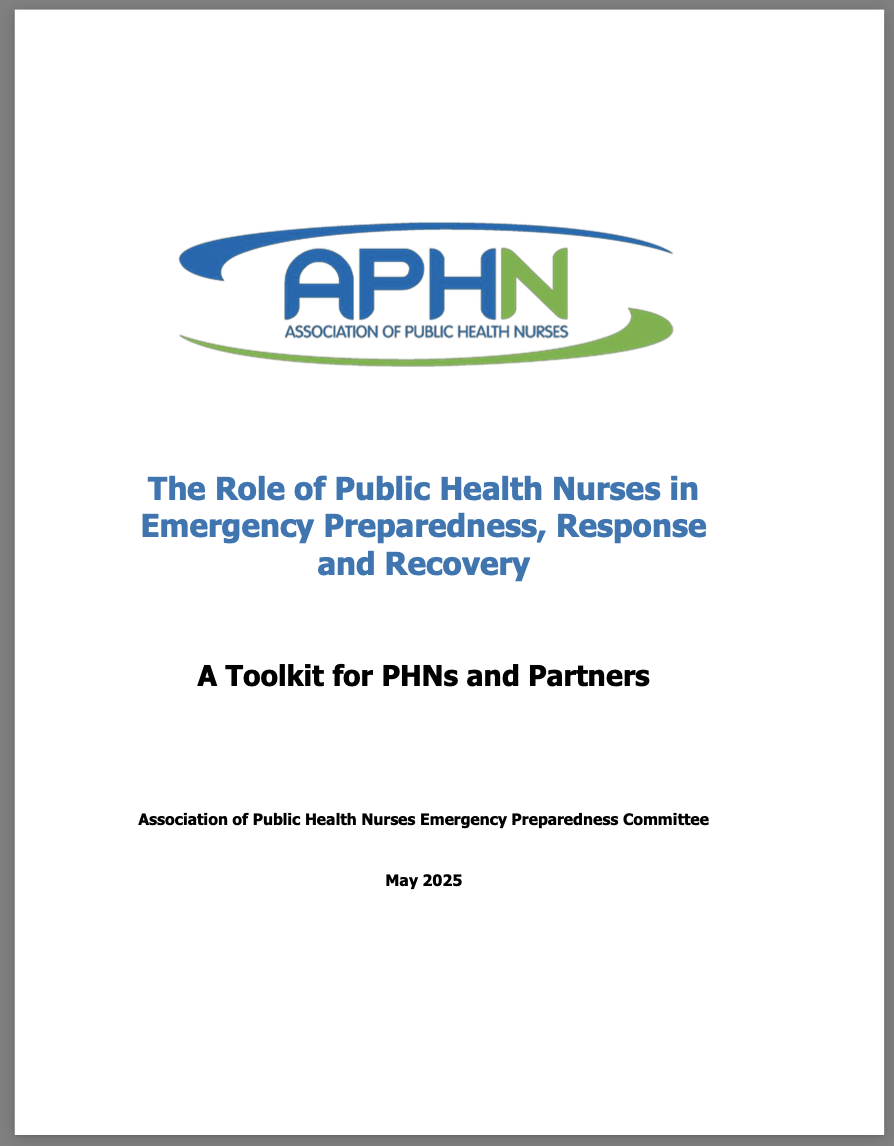
Resources
The Association of Public Health Nurses (APHN) Public Health Policy Committee prepared a public health policy advocacy guidebook and toolkit as a resource for public health nurses and other public health professionals to build knowledge and skills related to public policy advocacy.

The Certified in Public Health (CPH) exam is administered by the National Board of Public Health Examiners (NBPHE). Since 2008, more than 10,000 individuals have passed the CPH exam. The CPH designation demonstrates that an individual has mastered foundational competencies in public health.

Referencing both the American Nurses Association (ANA) Public Health Nursing Scope and Standards of Practice (ANA, 2022) the Public Health Emergency Preparedness and Response Capabilities (CDC, 2018), the APHN EPR toolkit provides an overview of the critical role of PHNs in EPR, as well as best practice guidance to new and experienced PHNs, their supervisors, and emergency managers for staff planning, training, and deployment.
PHN Fundamentals
Public Health Nurse Ready (PHN Ready)
This online certificate program is for RNs working in public health, or desiring to know about how public health works. LPNs and other RNs may find the certificate of interest as well.
All courses are self-paced and on-line, with most courses providing continuing education credits.
New to Public Health Residency Program (N2PH)
Start your public health career with confidence through the New to Public Health (N2PH) Residency Program. N2PH is an evidence-based, nationally recognized program designed to empower new public health professionals. N2PH strengthens the skills, confidence, and connections new hires need to thrive in their roles and build meaningful, long-term careers.
Position Papers
Future of Nursing 2020-2030: Charting a Path to Achieve Health Equity
APHN applauds the newly-released Future of Nursing 2020-2030: Charting a Path to Achieve Health Equity report highlighting the value of community and public health nursing. The related Report Brief “Valuing Community and Public Health Nurses” discusses how the COVID-19 pandemic has shown the important role of nurses not only in caring for the sick but in working to “contain and limit infection”. Community and public health nurses know that “infection” takes many forms, including structural bias and racism and social and economic inequities. Community and public health nurses are innovative in approaching and addressing inequities and the ongoing needs of our communities.
With the challenge of creating a path to health equity, this new report recommends investing in resources and funding to increase the number of community and public health nurses and establishing a national nursing workforce commission to track progress and develop further recommendations for preparing nurses to address the social determinants of health and advance health equity.
Public Health Nursing 3.0
The mission of Public Health 3.0 is to ensure the conditions in which everyone can be healthy, by expanding the focus on social and environmental determinants of health to achieve health equity. Communities across the country are demonstrating how this can be achieved, with local governmental public health in the lead and with public health nurses playing important roles. This is Public Health Nursing 3.0! Join and engage in APHN to learn more and advance your PHN 3.0 practice.
|